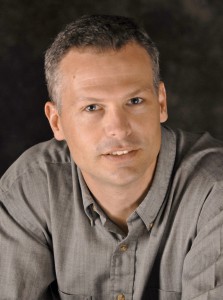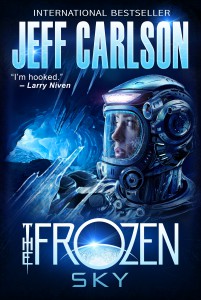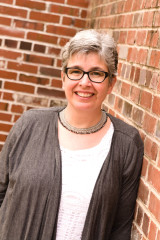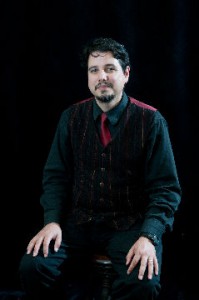 Jeff Carlson was a shortlister for the Campbell, a finalist for the Dick, and a first placer for WOTF. He is the author the alien Frozen Sky series and the post-apocalyptic Plague War series. His latest novel is the post-apocalyptic Interrupt. His short stories have appeared in Asimov’s and Strange Horizons. His short story collection is Long Eyes. His stories have been published in 16 languages.
Jeff Carlson was a shortlister for the Campbell, a finalist for the Dick, and a first placer for WOTF. He is the author the alien Frozen Sky series and the post-apocalyptic Plague War series. His latest novel is the post-apocalyptic Interrupt. His short stories have appeared in Asimov’s and Strange Horizons. His short story collection is Long Eyes. His stories have been published in 16 languages.
CARL SLAUGHTER: I listened to a podcast of “Topsider” on StarShipSofa. I was very impressed with the writing. So clear and efficient. Every passage is relevant, every sentence is in the right place, every scene is vivid. How did you learn to write so well? Did you attend a workshop? Do you have a ghost writer? Do you have an army of editorial assistants hidden in your basement combing over every word, every line, every paragraph? Are you an alien sent here to intimidate us human writers with your superior skill? Or do you just have a natural gift?
JEFF CARLSON: The truth is I’m the evil pod clone host of the poltergeists of Hemingway and Eliot. Every word is pure gold. Kneel before me, you fools!
Aha ha ha.
Thank you. No, actually I’m just an obsessive freak who fell in love with the spare, evocative styles of authors like Joe Haldeman, John Varley, Connie Willis and Spider Robinson right as I was coming of age as a fledging writer myself. Short story collections like Dealing In Futures and The Persistence of Vision made a vibrant impression on me. At their best, Haldeman and Varley could pack more human complexity into one sentence than some writers accomplish with a full page.
Most of their works are dated now. The science and the geopolitical scenarios in their books can seem alien to 21st Century thinking†� which isn’t a bad thing if you enjoy the “what if” sense of wonder on which science fiction is built. Seriously. Go read the Worlds trilogy or Steel Beach or Bellwether or Night Of Power. Those books are mind-croggling even if there’s not an iPhone in sight.
Early in my teens and twenties, I did attend a lot of conferences and book signings, soaking up as much as I could from established authors. I joined a local writer’s group. I have a B.A. in English Lit. Mostly I read a lot and wrote a lot. Trial by fire.
I came up the once-traditional path in writing. When I was fifteen, I cranked out a sprawling, million word epic novel. It was pretty bad but it had heart. Then I got serious, buckled down, and began writing short stories. Of course I tried to emulate the minimalist, shock-ya story arcs of Haldeman and company. It’s a real challenge to squeeze an entire plot and character development into the space of forty pages, especially if you’re also introducing new worlds and explaining futuristic science and weapons tech. Each story was also a different opportunity to play with voice or POV.
In time, I began selling short pieces to small press publications, then to semi-pro and finally to full-on professional magazines with glossy ads and comparatively nice pay rates. Then I wrote a new book. Landed an agent. Sold the book in a minor bidding war. I think some people still become writers that way even now after the e-revolution.
What I should add is that in the process, I learned everything I could about editing. Some of this education came through studying what the magazine editors and the staff at Penguin did with my manuscripts. Other tricks I learned through sheer repetition.
The brain is a muscle. You can strengthen it.
From first draft to final proofs, I read Plague Year more than forty times. The sequel, Plague War, I read thirty times. The third book in the trilogy, Plague Zone, I read twenty times. By the time I got to The Frozen Sky and Interrupt, I was reading my books fifteen times. I don’t know if I’ll go less than that, but I hope I’ve streamlined the process. I’ve learned to avoid some mistakes.
Oh, just to clarify: “Topsider” is an excerpt from The Frozen Sky, and Sky and its sequels are self-published. Yes, I have beta readers. No, there are zero professional editors involved. These books are essentially a solo act. I’m working without a net, although I have surrounded myself with a small squad of keen-eyed volunteers as well as paid masterminds like the cover artist, Jasper Schreurs, who’s a freaking genius.
The Frozen Sky includes a lot of science and several fields of science. Astrophysics, biology, geology, pharmacology, AIs, computer hacking. How much research do you have to do for all that science to be feasible and accurate? Or do you have a rolodex of consultants on speed dial?
I read a lot. I remember what I read. The bulletin board on my office wall is layered in a madman’s stack of print-outs and clippings. Oh, and I have this thing called the internet, ha ha. I’m constantly jumping online to reach how granite is formed or what’s the capital of Finland or because I need to examine the molecular structure of hemoglobin. As a sci fi guy, I’m also fortunate to know any number of real-world engineers and scientists. I pester them from time to time.
 The aliens in The Frozen Sky are intelligent, but they look a bit like squids, they don’t speak and they don’t have sight. Why not bipedal aliens like Vulcans or Klingons or Romulans with vocal cords and eyes?
The aliens in The Frozen Sky are intelligent, but they look a bit like squids, they don’t speak and they don’t have sight. Why not bipedal aliens like Vulcans or Klingons or Romulans with vocal cords and eyes?
Because I’m not constrained by a production budget! Ha. “Let’s glue some ears on him. We’ll glue some forehead thingies on them. Okay, we’re done.”
Star Trek is good fun but limited in presentation. That’s the beauty of being a novelist. The medium requires the reader’s imagination. Yes, I direct the action, but hard sf readers are smart readers. They want to be strangers in a strange land. So I can say, well, I have this claustrophobic three-dimensional low-gravity environment like the mazes of an ant farm inside Europa’s icy crust. What would kind of creatures would evolve here? Six-foot-tall bipedal creatures like people? Heck no.
The aliens have a math system and hieroglyphics type alphabet. Have they invented the wheel yet? How technologically advanced are they?
Man, I can’t tell you that! You’ll have to go deeper into the ice!
The novels of The Frozen Sky are told through the POV of Alexis Vonderach, one of the European astronauts. Why not the POV of a member of a different team like the Chinese or the Brazilians? Why not the POV of one of the aliens?
Great question. I have written novels with multiple POV storylines like Interrupt or the Plague Year trilogy†� but for The Frozen Sky, the setting is already so complicated, I wanted to ground the story as best I could.
Also, I really like Vonnie. She’s smart and brave and capable and resilient. Does she have her weaknesses? Yes. She’s very human. I felt like staying within her mind was a necessary focal point. The catacombs inside Europa’s “frozen sky” are a bizarre and horrific environment. Adding more storylines was too much.
Having said that, an early draft included some chapters from the POV of an alien. Holy cow, was that a chore! These aliens are really strange, am I right? Trying to convey their thoughts in English was like dropping acid at the bottom of a Vegas swimming pool with Hunter S. Thompson, three tigers, a box of cookies and leaking SCUBA masks while reciting a Latin mass with the pope on your waterproof phone to Snooki as she’s driving drunk in downtown L.A. through commuter traffic. Did you follow that? I don’t know what it means, either. That’s just an approximation of how convoluted it felt trying to write from inside the brain of a sunfish. Whoa, Nelly.
I hope I managed to convey their very foreign way of thinking in their dealings with Von and the other human characters. The transcripts of their sonar calls and body language were incredibly fun to write. Also, I love comparing so many of things we take for granted with the pure, straightforward existence of my alien tribes.
If there was an alien main character, what would he be saying to his friends about Earthlings? Kill them and feed them to our offspring. Perform an autopsy on one of them. Steal their technology. Maybe they’re causing all the geological instability.
Examples one, three and four are reasonable. Number two doesn’t sound like the sunfish because, well, they’d just eat ya†�
In the recent movie Europa Report, people travel to the same moon and encounter a similar alien. Then it turns into a body count horror movie as the squid picks off the entire crew. Instead, you have the two species interacting. What type of issues do they face trying to communicate with each other and understand each other’s cultures?
I haven’t seen Europa Report because I know I’d be disappointed. My book was first. More important, movies tend to suffer from the exact same problems you laid out for Star Trek and from the necessity for a body count.
That’s not to say The Frozen Sky doesn’t include sex and violence. Heck, the first 100 pages are basically one big chase scene, and among my favorite haters of all time is a lady who chastised me for using this novel to depict human beings as “just rutting animals with no purpose other than to destroy everything in sight with the exception of a few enlightened yet rutting souls.”
Hee hee. The oh-so-graphic depictions of sex in The Frozen Sky amount to a few interested glances between the heroine and her crewmates, one deep kiss, and an erotic thought or two from her POV.
Do I believe sex and violence are not only central to the human condition but also go hand in hand? God, yes. Look at what we consider entertainment. Look at the geopolitical scene. Every problem we have , pollution, racism, religious strife, war, disease , can be traced to overpopulation and the pressures between various groups or nations. Now that’s a nuts-and-bolts view of an extremely complex planet. We could spend our lifetimes connecting the dots. It’s easier to simplify everything to a basic dogma of “We’re right, they’re wrong,” but that easier view is part of what makes life harder on everyone in the world.
If sexuality makes you uncomfortable , if you think it’s scary or forbidden , I’d like to suggest that you have an immature sense of reality. Where did these seven freaking billion people come from if raw desire isn’t a major element of human motivation?
If greed , if destroying everything in sight , isn’t another major element of human motivation, why are our cities and slums expanding while the forests disappear and the oceans fill up with trash and poisons? Why are we fighting ancient wars over worthless deserts except to control everything we see? Granted, the oil in select areas of those deserts is valuable, but doesn’t that further prove my point? Is killing people for religious or racial differences better than killing them for energy sources?
Anyway. Too much coffee for me again this morning.
From what I see, we’re barely able to communicate among ourselves. Human beings cheat and lie and hurt each other. We have so many forms of insanity. Developing The Frozen Sky, I thought “Why wouldn’t intelligent aliens have their own delusions and conflicts?” Those fallacies would make it even harder for people and aliens to communicate.
Your work has been translated into 16 languages worldwide. How big of a chunk of your sales comes from foreign markets?
Never as much as I’d like. It is really, really fun to see my stories in languages I can’t read with new titles and new cover art. The experience is a mix of dÃ�’ �jÃ�’ vu and that awesome, twisty sense of “What if?”
When a foreign edition appears, it’s like having written an all-new book without having put in the work because those publishers have their own translators and artists. Every now and then a new magazine or a new novel shows up on my doorstep and I examine it with a smile, imagining how it reads in Spanish or Czech or whatever. Less frequently, I get fan mail from someone overseas, occasionally in broken English but usually in more grammatically precise English than my own, which is even more of a pleasure. Over time, I’ve struck up e-friendships with readers in the Netherlands, Estonia, Germany, you name it.
My job description is I sit alone in a room with a laptop listening to the voices in my head. It’s spectacular to hear from real live people who enjoy the books.
A lot of novelists continue to write short stories to keep their name out there. They have bylines on the cover of Asimov’s two or three times a year. They get nominated for multiple Hugos and Nebulas. They get top billing at conventions. You chose not to go that route. What was the reasoning and how has that worked out for you?
Ha! Is that a trick question? I would love to be nominated for Hugos and Nebulas and receive top billing at conventions. I didn’t choose not to go that route. I haven’t been invited!!!
Regardless, I don’t know that bylines in Asimov’s equate to Hugo nominations and GOH slots at the big cons. I’ve had three stories with Asimov’s, and Penguin took out a lovely full-page ad in the magazine to promote Plague Zone, which was seriously cool. Also, Sheila Williams is a gracious, witty, hard-working genius and a pleasure to work with†�
†�but these days I write very little short fiction because I have a family and a mortgage, and short fiction rarely pays well. Equally important, as a reader I prefer to sink my head into a good novel and stay with the characters for a while. Most people are the same way. Hence the pay rates for short fiction. There’s just not as much demand for short stories.
I’m totally overwhelmed with my life in the real world plus my own writing / editing / research / etc., so my choice is to write a chapter of the next book rather than a short story. I only have so many hours in the day. Having said that, surprise! I recently accepted an invitation to contribute to a new anthology, and I have two more pieces of short fiction in progress. It’s just a matter of carving out enough minutes to get to everything. I definitely need some Carlson Clones.
Big open-ended questions: After the ebook revolution, when have you opted for self-publishing and what was the result? When have you opted for traditional publishing and what was the result?
Late in 2010, I self-re-e-published the original short story of “The Frozen Sky” on Kindle, Nook, and iTunes. It sold 40,000 copies.
I’d always wanted to develop it into a novel. The setting is literally as large as an entire moon. That’s plenty of room for new storylines, surprises and reversals. So I moved this project to the front burner. Going solo involved any number of new learning curves, but, again, I’d been paying close attention to the game while working with Penguin for the Plague Year trilogy.
Late in 2012, I self-published the all-new The Frozen Sky: The Novel. To date, it’s sold 37,000 copies. For a hard sf novel, that’s a very strong number, better than a mid-lister would expect with a Big 5 publisher in NYC. Color me excited. Japanese rights recently sold to Tokyo Sogensha, and our hope is the book’s success will lead to more interest overseas and in Hollywood. Let’s face it. It’s a cool idea, and far better executed than Europa Report.
If I had to pitch The Frozen Sky in a few words, I’d say: “This story is Pitch Black crossed with The Thing, and it features a strong female lead in impossible situations.” Also, it wouldn’t demand a massive budget, more like Lucy than Prometheus.
As for the many forms of publishing in our brave new e-world, these days I’m sort of climbing back and forth over the fence. Traditional publishing was good to me, and I’d happily accept the right deal. In the meantime, Interrupt was published by 47North, one of the new Amazon imprints stocked with top editors and publicists who were headhunted out of New York and released from many of the usual corporate restraints. They’re wild-eyed e-pirates on the laser’s edge of the future, man! Working with 47North was a delight. The book did well. You can’t really say 47North is a traditional publisher because their focus is ebooks, but the process was similar and I take pride now in being a triple hybrid , a traditional, a new model, and a self-published writer.
What comfort level have you reached as an author? Do you have liveried servants, do you still mow your own lawn, or somewhere in between?
Uh, yeah. Someday I hope to become such a jaded bigshot that I float in a pool lazily dictating my lunatic visions to a super model while legions of butlers and maid polish the silverware and fold our all-organic silk wardrobes. Hasn’t happened yet. I’m still barely making an honest wage in part because the money’s up and down. I have fat months. I have lean months.
But it beats working for the man!
Hollywood used to be into spaceship sci fi. Now they’re into alien sci fi and post-apocalyptic sci fi. You’ve got both. Any feelers from Hollywood?
Paging Steven Spielberg†� Paging Mr. Spielberg†�
Which actress would you chose to play Von?
Someone who’s smart and bright-eyed. Quick of wit and quick in combat.
Got any advice to aspiring writers?
Get a job, hippie! Bwah ha ha ha.
No, seriously: writing is a sketchy way to make a living. It takes a lot of work (which you can control) and some luck (which you can’t control), so the main thing is to put butt in chair and grind away. Try not to make yourself too crazy. Use the crazy to drive you. A little monomania never hurt anybody. Finishing a novel can be a long, hard marathon, which is why I always recommend starting out with short stories. It’s a joy to finish something, and each short story can be a different experiment in voice or pacing. Love ‘em and leave ‘em. Move on. Work hard. Read a lot. Improve.
I suppose those sound like slogans, but there’s truth in slogans. Very few of us are the magic wunderkind who simply writes a perfect book and hits the bestseller lists. Most of us labor at our craft for years. We always labor at it. That means you need to enjoy the work. Write because you love listening to the voices in your head. Write because language and imagery and the human condition are fascinating to you. The work isn’t always fun, but should be satisfying.
That’s my five cents. If you don’t take satisfaction in the challenges you set for yourself, you’re doing it wrong. Enjoy the solitude. Enjoy the thinking. Believe me, when you get an email from Moscow or Dallas or Poughkeepsie informing you that you’re a genius, it’s worth the hours spent.
 Carl Slaughter is a man of the world. For the last decade, he has traveled the globe as an ESL teacher in 17 countries on 3 continents, collecting souvenir paintings from China, Korea, Thailand, Vietnam, and Egypt, as well as dresses from Egypt, and masks from Kenya, along the way. He spends a ridiculous amount of time and an alarming amount of money in bookstores. He has a large ESL book review website, an exhaustive FAQ about teaching English in China, and a collection of 75 English language newspapers from 15 countries.
Carl Slaughter is a man of the world. For the last decade, he has traveled the globe as an ESL teacher in 17 countries on 3 continents, collecting souvenir paintings from China, Korea, Thailand, Vietnam, and Egypt, as well as dresses from Egypt, and masks from Kenya, along the way. He spends a ridiculous amount of time and an alarming amount of money in bookstores. He has a large ESL book review website, an exhaustive FAQ about teaching English in China, and a collection of 75 English language newspapers from 15 countries.


 The aliens in The Frozen Sky are intelligent, but they look a bit like squids, they don’t speak and they don’t have sight. Why not bipedal aliens like Vulcans or Klingons or Romulans with vocal cords and eyes?
The aliens in The Frozen Sky are intelligent, but they look a bit like squids, they don’t speak and they don’t have sight. Why not bipedal aliens like Vulcans or Klingons or Romulans with vocal cords and eyes?

